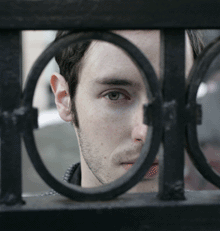Ryan Lee and the Mindless’s There Is No Music (Solari) was one of my favorite local albums of 2005. It’s a chapter torn from singer-songwriter Ryan Lee Crosby’s psychic diary, offered quietly as a lovely, spare tale of despair that ends with the promise of redemption.
 Crosby barely lived to tell it, but he relates his story with a sensitivity and command that reflects the most cohesive, open-hearted narratives of his influences: Nick Drake, Syd Barrett, and Elliott Smith. Touches of Syd’s wilder sonic side increasingly cozy up to the acoustic-boned arrangements as this nine-song collection reaches its end.
Crosby barely lived to tell it, but he relates his story with a sensitivity and command that reflects the most cohesive, open-hearted narratives of his influences: Nick Drake, Syd Barrett, and Elliott Smith. Touches of Syd’s wilder sonic side increasingly cozy up to the acoustic-boned arrangements as this nine-song collection reaches its end.
"A lot of the songs came from my experiences of roughly 2003 and 2004, which was a very dark period," Crosby relates with the same understatement that makes his debut as a leader such a thoughtful, probing gem. How dark? Well, when Crosby applies his sweet, quavering whisper to a lyric like "late last year I nearly died/it was the second time I tried" ("Belief in Me and You"), he’s just stating the facts. Crosby was in the midst of a struggle with an addiction to tranquilizers coupled with heavy habitual drinking, which fueled a wave of ennui that was already overwhelming.
"I had a doctor who was well intentioned, but I would tell him I was trying to quit drinking and I was having trouble and needed to mellow out, so he’d write me a prescription for codeine or tranquilizers, and then I’d take them along with the alcohol," Crosby explains. "There were days that I would just lie in bed sick, trying to figure out what I wanted to do."
Crosby was also estranged from his father, who was suffering from cancer. And his band, the spirited Cancer to the Stars, which lived in the territory between trip-hop, punk, and Radiohead, was fragmenting around him.
"It got to the point where I wanted to make a clean break musically and with other aspects of my life," he says as we shovel in a weekday morning breakfast at the Grecian Yearning diner in Allston, not too far from his home. "At one point I’d even lost my voice, because I was shredding my vocal chords every time I sang with Cancer to the Stars. Even when we practiced I just turned up my guitar and screamed, which was great, I guess, for getting everything I was feeling out. I thought that I probably wouldn’t have any trouble until I was 28 or so [he’s 25], but I was wrong. One day I tried to sing and nothing would come out. That lasted for six weeks. I saw a specialist who said there was no permanent damage, but that I needed to see a vocal coach."
Having slipped from the grasp of addiction and self-destruction a year ago, Crosby began working on the songs for There Is No Music. To a certain extent they were a form of therapy. The fragile state from which numbers like "Belief in Me and You" and "(a person has the right to) Peace in the Home," inspired by the tension Crosby’s father’s cancer caused between the musician’s parents, is reflected in their whispered vocal melodies and the occasional crescendos that snap loose his coils of frustration.